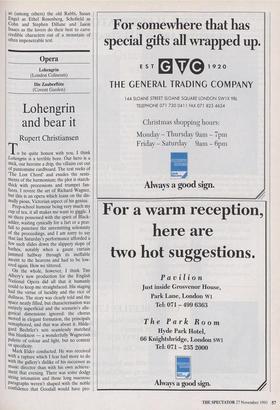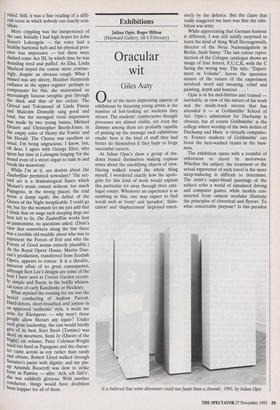Opera
Lohengrin
(London Coliseum)
Die Zauberflote (Covent Garden)
Lohengrin and bear it
Rupert Christiansen
To be quite honest with you, I think Lohengrin is a terrible bore. Our hero is a stick, our heroine a drip, the villains cut out of pantomime cardboard. The text reeks of The Lost Chord' and exudes the senti- ments of the harmonium; the plot is starch- thick with processions and trumpet fan- fares. I revere the art of Richard Wagner, but this is an opera which leans on the dis- mally pious, Victorian aspect of his genius.
Prep-school humour being very much my cup of tea, it all makes me want to giggle. I sit there possessed with the spirit of Black- adder, waiting cynically for a fart or a prat- fall to puncture the unremitting solemnity of the proceedings, and I am sorry to say that last Saturday's performance afforded a few such slides down the slippery slope of bathos, notably when a gauze curtain Jammed halfway through its ineffable ascent to the heavens and had to be low- ered again. How we tittered.
On the whole, however, I think Tim Albery's new production for the English National Opera did all that it humanly could to keep me straightfaced. His staging had the virtue of lucidity and the vice of dullness. The story was clearly told and the space neatly filled, but characterisation was entirely superficial and the scenario's alle- gorical dimensions ignored: the chorus moved in elegant formation, the principals semaphored, and that was about it. Hilde- gard Bechtler's sets seamlessly matched this blankness — a wonderfully Wagnerian palette of colour and light, but no context or specificity.
Mark Elder conducted. He was received with a rapture which I fear had more to do with the gallery's dislike of his successor as music director than with his own achieve- ment that evening. There was some dodgy string intonation and those long maestoso paragraphs weren't shaped with the noble confidence that Goodall would have pro- vided. Still, it was a fine reading of a diffi- cult score in which nobody can exactly scin- tillate.
More crippling was the inexperience of the cast. Initially I had high hopes for John Keyes's Lohengrin — the voice had a healthy baritonal heft and his physical pres- ence was impressive — but these were dashed come Act III, by which time he was sounding tired and puffed. As Elsa, Linda Macleod stayed the course more convinc- ingly, despite an obvious cough. What I missed was any silvery, Heather Harperish radiance in the upper register: perhaps to compensate for this, she maintained an increasingly fatuous seraphic grin through the thick and thin of her ordeal. The Ortrud and Telramund of Linda Finnie and Malcolm Donnelly sang good and loud, but the strongest vocal impression was made by two young basses, Michael Druiett and Christopher Booth-Jones, in the empty roles of Henry the Fowler and his Herald. The Chorus was excellent as usual. I'm being ungracious, I know, but, oh dear, I agree with George Eliot, who spent her time at Lohengrin longing 'for the sound even of a street organ to rush in and break the monotony'.
While I'm at it, are doubts about Die &tuber/kite permitted nowadays? The sec- ond act is a dramaturgical fiasco which Mozart's music cannot redeem: too much Papageno, in the wrong places; the trial scene a damp squib; the defeat of the Queen of the Night inexplicable. I could go on, but for the moment let me just add that I think that on stage such sleeping dogs are best left to lie. Die Zaubetfleite works best as pantomime, no questions asked. (Dent's view that somewhere along the line there was a terrible old muddle about who was to represent the Forces of Evil and who the Forces of Good seems entirely plausible.) At the Royal Opera House, Martin Dun- can's production, transferred from Scottish Opera, appears to concur. It is a likeable, innocent affair of no great consequence, although Ken Lee's designs are some of the best I have seen at Covent Garden recent- ly: simple and fluent, in the boldly whimsi- cal tones of early Kandinsky or Hockney. What stymied the evening for me was the horrid conducting of Andrew Parrott. Hard-driven, short-breathed and joyless in an approved 'authentic' style, it made me ache for Klemperer — why won't these People allow Mozart any legato? Under such grim leadership, the cast would hardly give of its best. Kurt Streit (Tamino) was short on sweetness, Sumi Jo (Queen of the Night) on volume; Peter Coleman-Wright tried too hard as Papageno and the charac- ter came across as coy rather than randy and obtuse; Robert Lloyd walked through Sarastro's paces with dignity; and my pin- up Amanda Roocroft was slow to strike form as Pamina — after 'Ach, ich she was suddenly glorious. With another conductor, things would have doubtless been happier for all of them.











































































 Previous page
Previous page